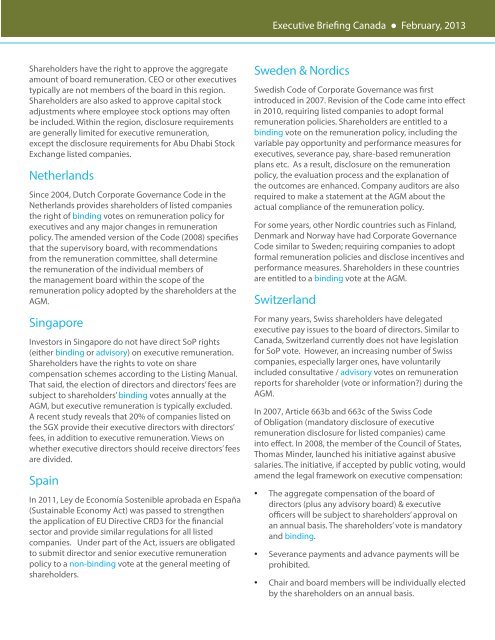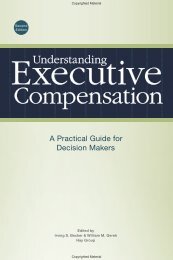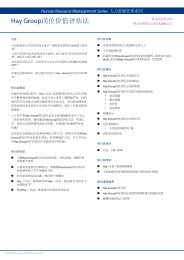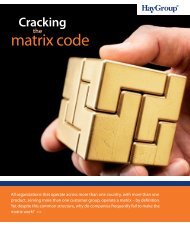Executive Briefing Canada - Hay Group
Executive Briefing Canada - Hay Group
Executive Briefing Canada - Hay Group
Create successful ePaper yourself
Turn your PDF publications into a flip-book with our unique Google optimized e-Paper software.
<strong>Executive</strong> <strong>Briefing</strong> <strong>Canada</strong> ● February, 2013<br />
Shareholders have the right to approve the aggregate<br />
amount of board remuneration. CEO or other executives<br />
typically are not members of the board in this region.<br />
Shareholders are also asked to approve capital stock<br />
adjustments where employee stock options may often<br />
be included. Within the region, disclosure requirements<br />
are generally limited for executive remuneration,<br />
except the disclosure requirements for Abu Dhabi Stock<br />
Exchange listed companies.<br />
Netherlands<br />
Since 2004, Dutch Corporate Governance Code in the<br />
Netherlands provides shareholders of listed companies<br />
the right of binding votes on remuneration policy for<br />
executives and any major changes in remuneration<br />
policy. The amended version of the Code (2008) specifies<br />
that the supervisory board, with recommendations<br />
from the remuneration committee, shall determine<br />
the remuneration of the individual members of<br />
the management board within the scope of the<br />
remuneration policy adopted by the shareholders at the<br />
AGM.<br />
Singapore<br />
Investors in Singapore do not have direct SoP rights<br />
(either binding or advisory) on executive remuneration.<br />
Shareholders have the rights to vote on share<br />
compensation schemes according to the Listing Manual.<br />
That said, the election of directors and directors’ fees are<br />
subject to shareholders’ binding votes annually at the<br />
AGM, but executive remuneration is typically excluded.<br />
A recent study reveals that 20% of companies listed on<br />
the SGX provide their executive directors with directors’<br />
fees, in addition to executive remuneration. Views on<br />
whether executive directors should receive directors’ fees<br />
are divided.<br />
Spain<br />
In 2011, Ley de Economía Sostenible aprobada en España<br />
(Sustainable Economy Act) was passed to strengthen<br />
the application of EU Directive CRD3 for the financial<br />
sector and provide similar regulations for all listed<br />
companies. Under part of the Act, issuers are obligated<br />
to submit director and senior executive remuneration<br />
policy to a non-binding vote at the general meeting of<br />
shareholders.<br />
Sweden & Nordics<br />
Swedish Code of Corporate Governance was first<br />
introduced in 2007. Revision of the Code came into effect<br />
in 2010, requiring listed companies to adopt formal<br />
remuneration policies. Shareholders are entitled to a<br />
binding vote on the remuneration policy, including the<br />
variable pay opportunity and performance measures for<br />
executives, severance pay, share-based remuneration<br />
plans etc. As a result, disclosure on the remuneration<br />
policy, the evaluation process and the explanation of<br />
the outcomes are enhanced. Company auditors are also<br />
required to make a statement at the AGM about the<br />
actual compliance of the remuneration policy.<br />
For some years, other Nordic countries such as Finland,<br />
Denmark and Norway have had Corporate Governance<br />
Code similar to Sweden; requiring companies to adopt<br />
formal remuneration policies and disclose incentives and<br />
performance measures. Shareholders in these countries<br />
are entitled to a binding vote at the AGM.<br />
Switzerland<br />
For many years, Swiss shareholders have delegated<br />
executive pay issues to the board of directors. Similar to<br />
<strong>Canada</strong>, Switzerland currently does not have legislation<br />
for SoP vote. However, an increasing number of Swiss<br />
companies, especially larger ones, have voluntarily<br />
included consultative / advisory votes on remuneration<br />
reports for shareholder (vote or information?) during the<br />
AGM.<br />
In 2007, Article 663b and 663c of the Swiss Code<br />
of Obligation (mandatory disclosure of executive<br />
remuneration disclosure for listed companies) came<br />
into effect. In 2008, the member of the Council of States,<br />
Thomas Minder, launched his initiative against abusive<br />
salaries. The initiative, if accepted by public voting, would<br />
amend the legal framework on executive compensation:<br />
• The aggregate compensation of the board of<br />
directors (plus any advisory board) & executive<br />
officers will be subject to shareholders’ approval on<br />
an annual basis. The shareholders’ vote is mandatory<br />
and binding.<br />
• Severance payments and advance payments will be<br />
prohibited.<br />
• Chair and board members will be individually elected<br />
by the shareholders on an annual basis.
















